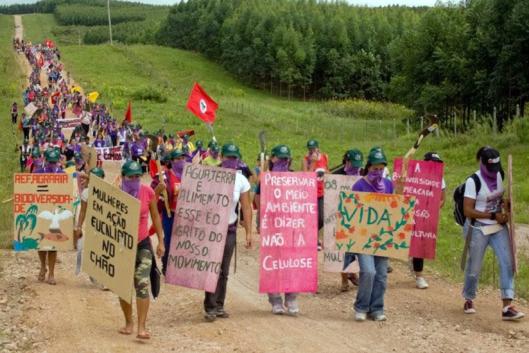Women, particularly those who depend on forests for their livelihoods and sustenance, face many struggles.
Women often lead various types of resistance against violent threats to their territories, communities, ancestral cultures livelihoods and lives. Many also denounce the patriarchal and racist nature of the capitalist system. And many also have to deal with the chauvinist and sexist practices that are commonplace within their own communities, families and even resistance movements. Such forms of discrimination tend to obscure the dignified work and knowledge of women, infringe on their efforts to emancipate and empower themselves, and place at risk their roles of leadership through the harassment and violence they are exposed to.
The different forms of violence that many women suffer on a daily basis tend to increase dramatically when industrial plantations take over their territories. Industrial plantations occupy land traditionally used for cultivation and they cause contamination of water sources and soils as a result of the agrotoxins used in these monocultures. Industrial tree plantations also restrict freedom of movement and cause harassment and sexual abuse – for which the perpetrators are rarely persecuted.
Women's Day is also a call to join women’s struggles against violence and discrimination. It's a day to highlight the need to break the silence about the grave oppression, sexual abuse and dispossession of women's freedoms and women's autonomy to take decisions regarding their own bodies and lives. The WRM joins this call in solidarity, and expresses its deepest respect for the countless struggles that indigenous, peasant and Afro-descendant women, quilombolas, fisherwomen, and female artisans and healers have to confront to defend their territories and lives with dignity.
The destruction of forests and territories is not only capitalist and extractivist, but also patriarchal and racist!
Recommended articles:
Resistance by Women Defenders of Territory to Extractivism in Latin America
Women in the anti-mining struggle in El Salvador: “We are that swarm of bees”
The Philippines: Defending the defenders, defending their rights
India: Women, Commons and Patriarchy
Women and Property in Cameroon: Laws and Reality
Women and Traditional Oil Palm: A Struggle for Life
Liberia: Women raising their voices in decision-making processes
